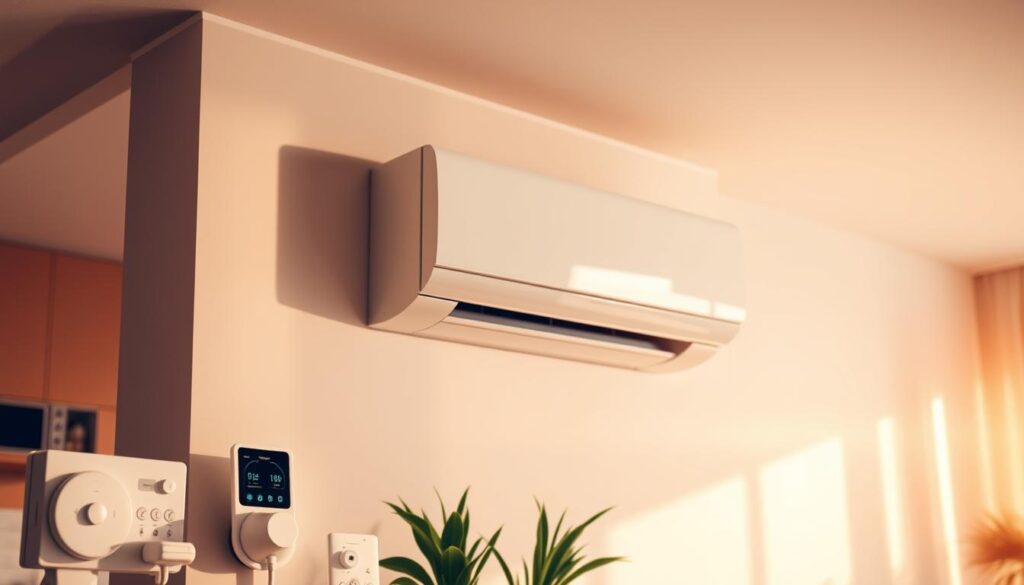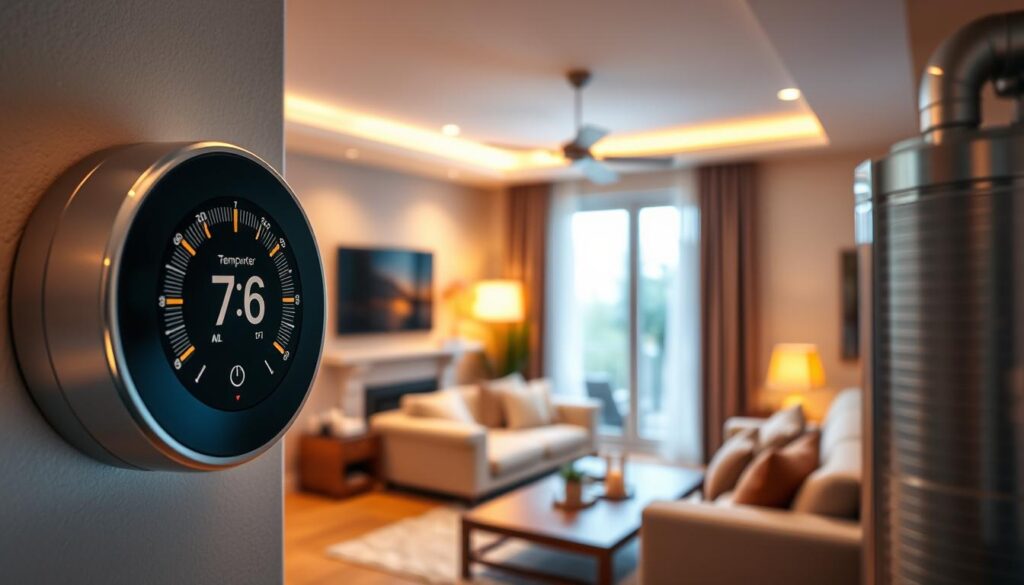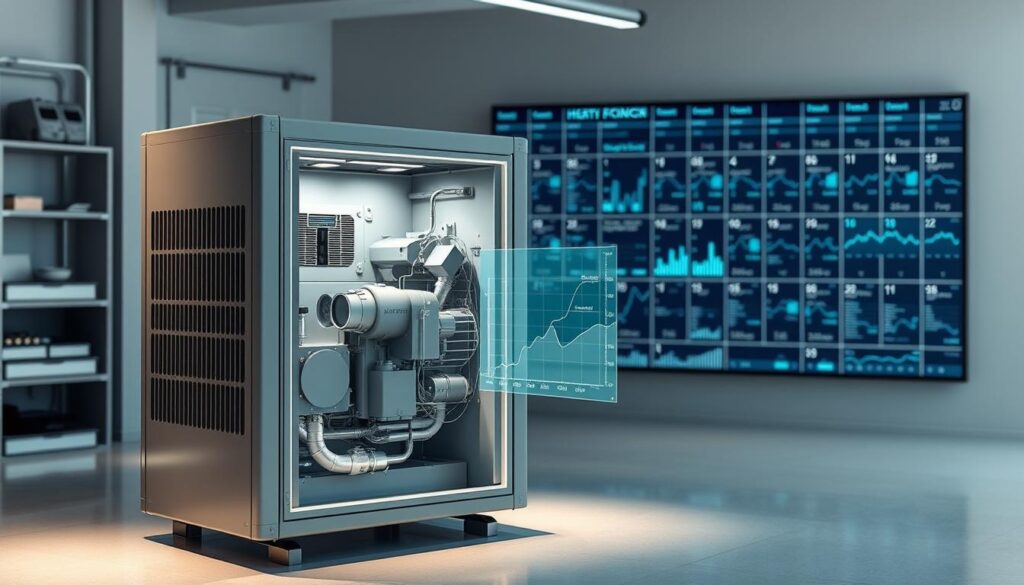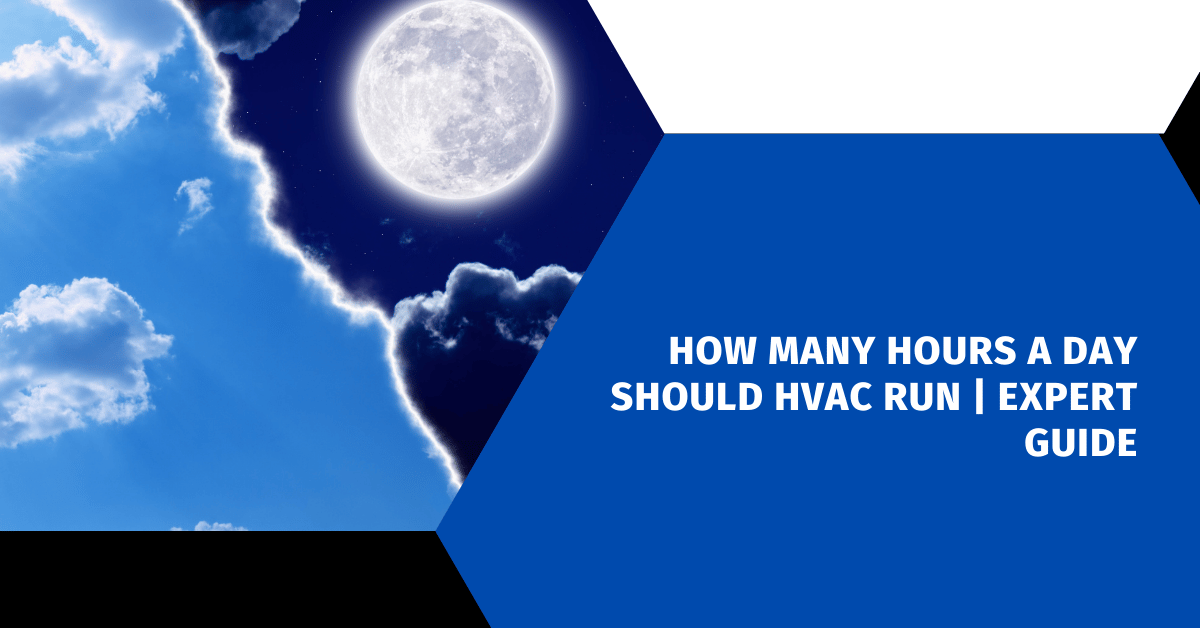How Many Hours a Day Should HVAC Run? Ever thought if your HVAC system runs too much or too little? Knowing the right hours for it can save money, improve comfort, and make your system last longer.

HVAC systems usually run in 15-20 minute cycles. This is the best way to keep your home at a steady temperature without wearing out your equipment too fast.
Your HVAC system does more than just control the temperature. It’s a complex machine that keeps your home comfortable and uses less energy. Finding the perfect balance in how long it runs can greatly improve your home’s performance.
Key Takeaways
- HVAC systems typically run 15-20 minutes per hour
- Proper runtime reduces energy consumption
- Consistent maintenance prevents excessive system wear
- Temperature settings impact overall system performance
- Regular inspections help optimize HVAC efficiency
Table of Contents
Understanding HVAC System Operation Basics
Your home’s comfort comes from a network of heating, ventilation, and air conditioning (HVAC) parts working together. Modern HVAC systems are complex machines. They keep your home at the right temperature and use energy wisely.
Knowing your HVAC system’s parts can help you get the most out of it. These systems are not just for setting temperatures. They are engineering wonders that keep your home cozy all year.
Key Components of an HVAC System
- Furnace: Provides heating during cold months
- Air Conditioner: Cools your home in summer
- Ductwork: Distributes conditioned air throughout your home
- Thermostat: Controls system runtime and temperature
How HVAC Systems Heat and Cool Your Home
HVAC systems move heat around. In winter, the furnace warms your home. In summer, the air conditioner cools it. How long your HVAC runs depends on your home’s size, insulation, and the weather outside.
| HVAC Component | Primary Function | Average Lifespan |
|---|---|---|
| Furnace | Heating | 15-20 years |
| Air Conditioner | Cooling | 10-15 years |
| Smart Thermostat | Runtime Control | 5-10 years |
The Role of Thermostats in Runtime Control
Modern thermostats are the brain of your HVAC system. Smart thermostats can cut energy use by up to 25%. They learn your home’s temperature patterns and adjust the HVAC’s run time for comfort and savings.
By understanding your HVAC system’s components and operation, you can make informed decisions about its maintenance and usage.
Ideal HVAC Runtime During Different Seasons
Knowing how long your HVAC should run in each season is key for comfort and saving energy. The time your system runs changes a lot between summer and winter. This depends on the outside weather and how comfortable you want your home to be.
When it’s very hot or cold, your HVAC works harder. In summer, it runs more to cool your home. In winter, it needs careful timing to keep your home warm without wearing it out.
- Summer runtime: Typically 15-20 minutes per hour
- Winter runtime: Varies based on insulation and outdoor temperatures
- Continuous fan operation recommended in humid climates
Choosing the right runtime for each season depends on a few important things:
| Season | Average Runtime | Key Considerations |
|---|---|---|
| Summer | 25-33% of time | High humidity, heat management |
| Winter | 15-25% of time | Insulation, heat retention |
“Proper HVAC runtime optimization can reduce energy costs by up to 20%” – HVAC Energy Efficiency Report
Using a programmable thermostat can help you get your system just right. It adjusts based on the weather and your comfort level. Remember, every home is unique, so monitoring and adjusting your HVAC runtime is key to maintaining optimal comfort and efficiency.
Explore Our HVAC Shop
Looking for top-rated HVAC tools, parts, and accessories? Visit our shop and find the perfect solution for your needs.
Visit the ShopHow Many Hours a Day Should HVAC Run
Knowing how long your HVAC should run is key to keeping your home comfy and saving energy. Your HVAC system is vital for controlling indoor temperatures. Figuring out the right hours can boost performance and cut down on energy bills.
Standard Runtime Guidelines
Most HVAC systems have set runtime patterns for best performance. Here are some important guidelines:
- Typical AC cycles should last about 20 minutes
- Recommended HVAC fan runtime is 10-20 minutes per cycle
- Two to three cycles per hour during mild temperatures
Signs of Excessive Runtime
Knowing when your HVAC runs too long can save wear and cut energy bills. Look out for these signs:
- Constant running without reaching desired temperature
- Significant increases in electricity costs
- Unusual noises during extended operation
Optimal Cycling Patterns
Finding the right balance in HVAC runtime is about knowing your system’s limits. Efficiency depends on proper cycling.
| Temperature Condition | Recommended Cycle Time | Energy Impact |
|---|---|---|
| Mild Weather | 10-20 minutes | Low Energy Consumption |
| Extreme Heat (100°F+) | 20-25 minutes | Higher Energy Usage |
| Extreme Cold (Near 0°F) | 25-30 minutes | Increased Energy Demand |
By following these guidelines, you can make your HVAC work better, save on energy, and keep your home comfy.
Explore Our HVAC Shop
Looking for top-rated HVAC tools, parts, and accessories? Visit our shop and find the perfect solution for your needs.
Visit the ShopFactors Affecting HVAC Runtime Duration
Knowing what affects your HVAC usage is key for comfort and saving energy. Several important factors influence how long your HVAC runs during the best times.
The main factors that affect HVAC duty cycle include:
- Home Size and Layout: Bigger homes need more time and energy to cool or heat, making systems run longer
- Insulation Quality: Bad insulation increases the system’s workload
- Outdoor Temperature: Very hot or cold weather makes systems run longer
- Humidity Levels: High humidity makes cooling harder
Your home’s features greatly affect HVAC runtime. An air conditioner usually takes 15 to 20 minutes to cool by one degree. But, poor insulation can make it take much longer, making your system work harder and use more energy.
Thermostat settings and smart home tech can improve your HVAC’s performance. Programmable thermostats let you set temperature changes, cutting down on unnecessary runtime and saving energy.
Pro Tip: Sealing air leaks and keeping insulation in good shape can cut your HVAC system’s workload by up to 30%.
Regular maintenance is essential for your HVAC’s best performance. Experts say to check air filters monthly and replace them every 60-90 days to avoid extra strain on the system.
Impact of Home Size and Insulation on HVAC Operation
Your home’s size and insulation matter a lot for efficient HVAC use. The bigger your home and the better its insulation, the longer your HVAC system runs. This keeps your home at a comfortable temperature.
Knowing how your home affects your HVAC can help you save energy. Let’s look at the main factors that influence your system’s performance.
Square Footage Considerations
The size of your home greatly affects how long your HVAC runs. Bigger homes need more energy to stay cool or warm. This means:
- Bigger homes typically need longer HVAC runtime
- Smaller homes can maintain temperature more quickly
- Properly sized systems match home square footage for efficient operation
Insulation Quality Effects
Insulation is key in managing HVAC runtime. Well-insulated homes can reduce HVAC system workload by up to 50%. The main benefits include:
- Reduced heat transfer between indoor and outdoor environments
- Decreased energy consumption
- More consistent indoor temperatures
Air Leakage Impact
Air leaks can make your HVAC system work much harder. Gaps around windows, doors, and joints let conditioned air out. This forces your system to work harder.
A home with poor insulation can see HVAC systems running up to 50% longer than well-sealed spaces.
To boost efficiency, think about getting a professional energy audit. Also, seal any air leaks in your home.
Explore Our HVAC Shop
Looking for top-rated HVAC tools, parts, and accessories? Visit our shop and find the perfect solution for your needs.
Visit the ShopTemperature Settings and Their Effect on Runtime

Your thermostat settings are key to how long your HVAC system runs. The temperature you pick affects how much energy it uses.
Different temperatures change how long your HVAC runs. To be comfy and save energy, follow these tips:
- Keep your thermostat between 72-75 degrees for the best comfort
- Avoid very high or low temperatures that make your system work harder
- Use programmable thermostats to control how long your HVAC runs
Knowing how temperature affects your system helps you use less energy. A thermostat at 65 degrees makes your AC work longer than one at 72 degrees. It takes about 15-18 minutes for your home to cool by one degree.
Seasons matter a lot for your HVAC. In summer, your AC runs more to keep your home cool. But on milder days, it doesn’t need to cool as much.
Pro Tip: Try to keep your AC cycles around 15 minutes on and off. This keeps your home comfy and your system running well.
By smartly setting your temperature, you can make your HVAC run less, save energy, and stay cozy at home.
Signs Your HVAC System Is Running Too Much
Knowing how long your HVAC runs is key to keeping your home comfy and saving energy. If it runs too much, it might mean there’s a problem. This could lead to higher energy bills and damage to your system.
Common Warning Signs
Here are some signs your HVAC might be running too much:
- High energy bills that go up suddenly
- Temperatures that don’t stay even in different rooms
- The system runs almost all the time without getting to the right temperature
- It keeps turning on and off a lot
Troubleshooting Steps
Here’s what you can do if your HVAC runs too much:
- Make sure to change your air filters often
- Look for any leaks in the ductwork
- Check if your thermostat is working right
- See if your system is getting old and worn out
When to Call a Professional
Some issues need a pro to handle your HVAC:
| Warning Sign | Professional Action Required |
|---|---|
| Constant system operation | Comprehensive system diagnostic |
| Refrigerant leak suspicion | Immediate professional inspection |
| Unit over 10 years old | Efficiency and replacement evaluation |
Knowing about HVAC runtime can save you money and keep your home comfy. Regular upkeep keeps your system running well and lasts longer.
Explore Our HVAC Shop
Looking for top-rated HVAC tools, parts, and accessories? Visit our shop and find the perfect solution for your needs.
Visit the ShopEnergy Efficiency and HVAC Runtime

Managing your HVAC system’s runtime is key to saving energy and cutting down on utility bills. Knowing the best time to use your HVAC can help you save money and keep your home comfortable.
The ideal time for your HVAC to run is between 8 to 14 hours a day. This depends on your home and the local weather. How often your HVAC runs affects how much energy it uses and how well it works.
- Central air systems should operate approximately 8-10 hours daily
- Window units may run 12-16 hours during peak summer days
- Portable air conditioners often function 16-20 hours in extreme temperatures
Smart strategies can make your HVAC system much more energy-efficient:
- Install a programmable thermostat
- Maintain consistent temperature settings
- Ensure proper home insulation
- Schedule regular system maintenance
| HVAC Type | Ideal Daily Runtime | Energy Efficiency Rating |
|---|---|---|
| Central Air | 8-14 hours | SEER 13-21 |
| Window Unit | 12-16 hours | SEER 10-15 |
| Portable AC | 16-24 hours | SEER 8-12 |
Pro tip: Aim for 15-20 minute cycles with brief rest periods to optimize your system’s performance and reduce energy waste.
Maintenance Tips to Optimize HVAC Operation
Keeping your HVAC system running well is key to good performance. Regular care can make your system last longer and work better.
To get the most out of your HVAC, follow these important maintenance tips:
- Replace air filters every 1-3 months to ensure optimal airflow
- Schedule professional tune-ups at least annually
- Clean indoor and outdoor coils to maintain system efficiency
- Check and seal ductwork for air leakage prevention
- Inspect thermostat calibration for accurate temperature control
Professional maintenance can boost energy efficiency by up to 30%. Nearly 70% of HVAC service calls are filter-related, showing how vital regular upkeep is.
“Proper maintenance is the key to extending your HVAC system’s life and performance.” – HVAC Experts
Regular maintenance brings many benefits:
- Reduces energy consumption by up to 15%
- Prevents costly unexpected repairs
- Maintains indoor air quality
- Ensures warranty compliance
By spending time on routine maintenance, you can improve your HVAC’s performance. You’ll save on energy costs and enjoy consistent comfort at home.
Conclusion
Knowing how many hours your HVAC should run is key for comfort and saving energy. The hours your HVAC runs affect its performance and how much energy you use. Air conditioning uses about 12% of your home’s energy, so managing it well is important.
Many things influence how long your HVAC should run, like your home’s size and insulation. Using smart thermostats and keeping your system in good shape can help. Experts say running it for about 8 hours a day is a good balance between comfort and saving energy.
But managing your HVAC is more than just how long it runs. Changing air filters, ensuring good air flow, and getting professional checks are also important. Following this guide can lower your energy bills and make your system last longer, keeping your home cozy.
Being proactive about your HVAC’s runtime is good for your home and wallet. Take the time to learn what your system needs and adjust your habits to match.

